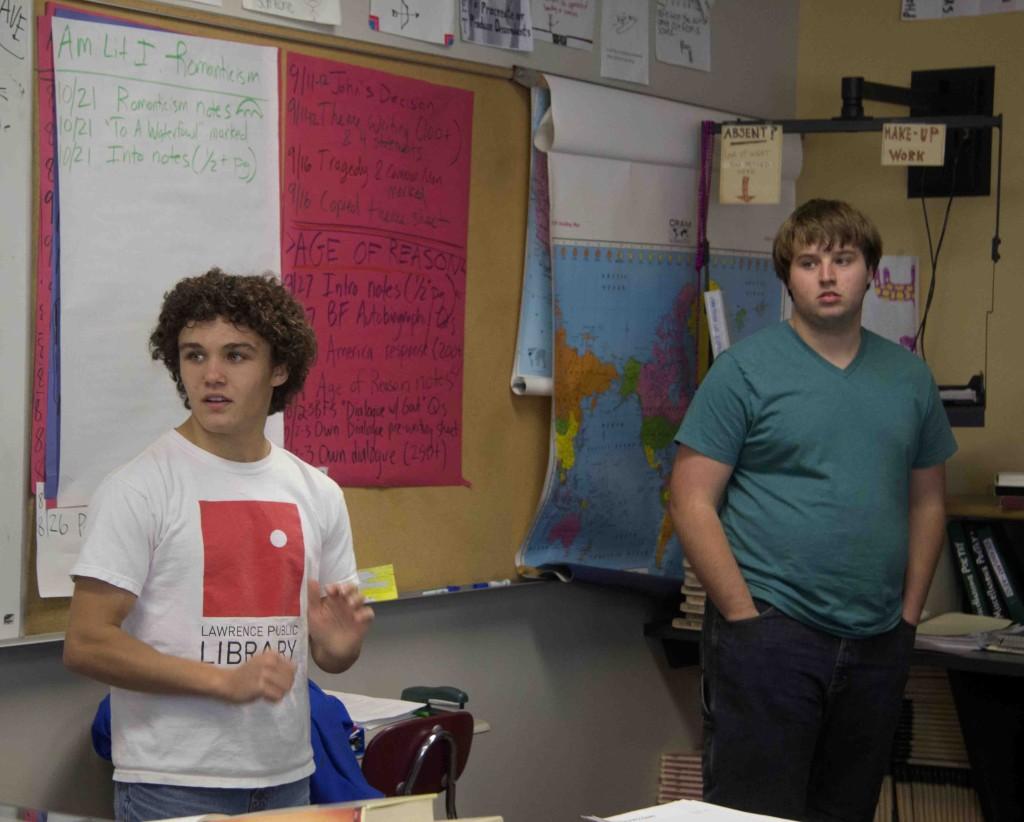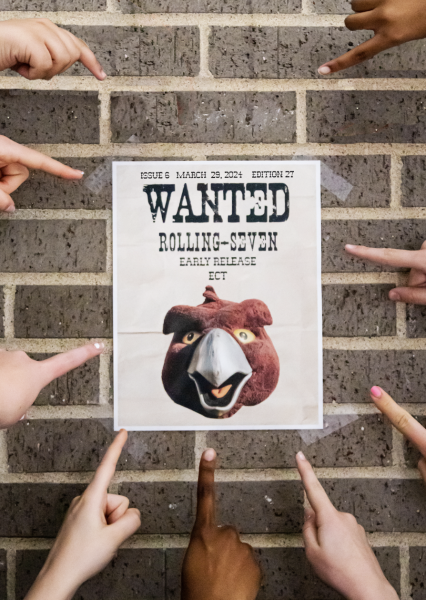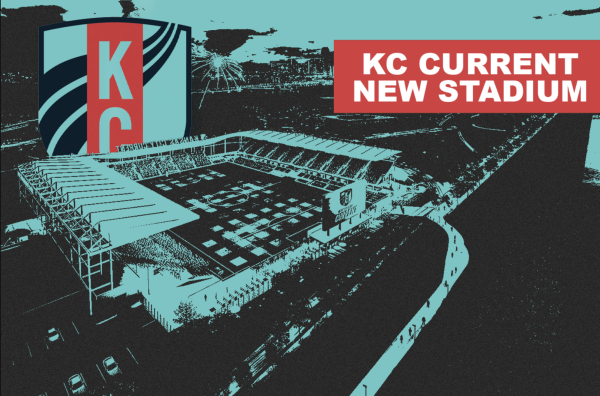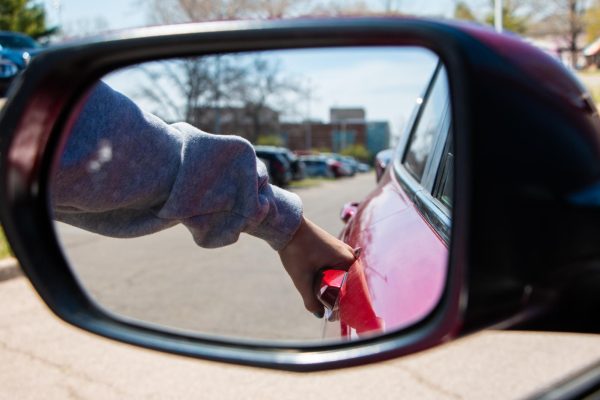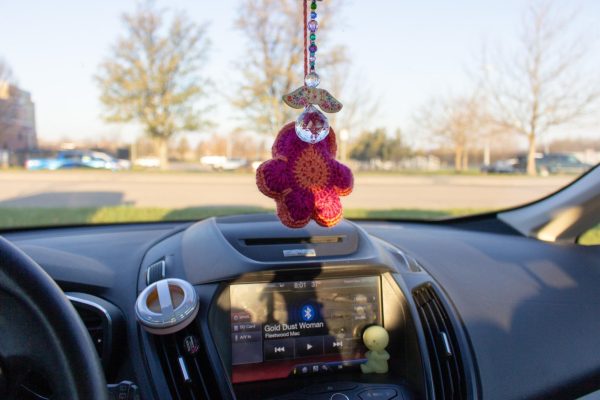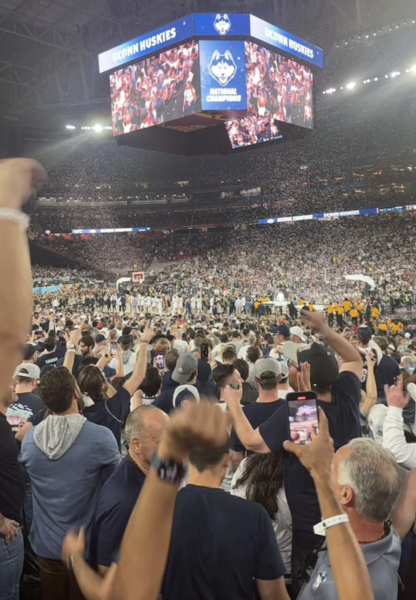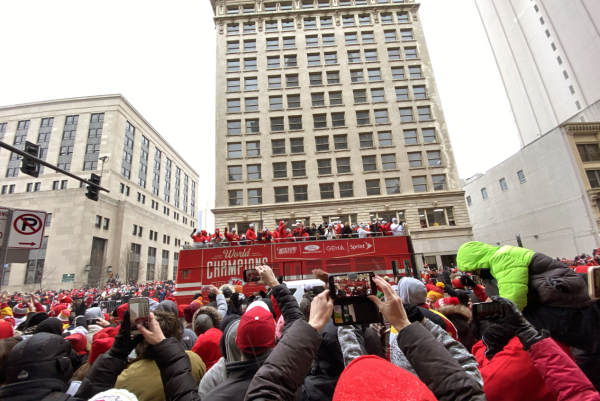Secular Student Alliance Club
Secular Alliance Club officers juniors Kenneth Palmer and Brendan Phillips lead group discussion during a Secular Alliance Club meeting. The club meets in Room 144 after school on Mondays.
When club officers juniors Kenneth Palmer, Lorel Rodgers and Brendan Phillips arrived at Room 144 to hold the Secular Student Alliance’s first meeting, they were met with a Bible in front of the door, blocking their entrance.
The club members interpreted this action as an attempt to deter the club from gathering.
“At the first meeting, someone put a Bible in front of the door as kind of a warning,” said Nicholas Sickels, freshman Secular Alliance Club member.
That act of opposition against the new club was not the first in a long string of displays of disapproval against the idea of having a club devoted to non religious students.
“We have had problems since we started hanging up signs and posters,” Palmer said. “There’s a lot of ripped down posters, and like, messed up posters. So actually, I found out after starting this club that [the lack of religious and non religious tolerance is] a lot worse than I thought it was.”
Created to give students of all religious and nonreligious affiliations a “safe space” to discuss beliefs, Secular Alliance Club has stirred dissention among the student body. The club’s members feel that the rest of the student body has often misinterpreted the club’s purpose.
“I think the biggest point is that our goal is to create tolerance and just to create an awareness as to who we are–that we are people who are not religious, but we are not out to get anyone, out to convert anyone, to hurt anyone or out to insult other people’s beliefs,” Palmer said.
The club does not limit membership merely to those who have a secular viewpoint. The officers encourage people of all religious and nonreligious affiliations to join and work to dispel negative preconceived notions about different ideas.
“We are welcoming people who are religious and people who are not religious,” Palmer said. “[We are] trying to create an atmosphere of cooperation. We are trying to fix some of the problems, some of the stereotypes and some of the bad ideas that people have about those who don’t have the same beliefs as them.”
Many view the club as a place for people to bash religion; however, the club’s officers emphasize respect and tolerance in all of their group discussions.
“There were a few people that came the very first time who were really looking forward to it, but they seemed a little more outspoken and coming for the wrong reasons,’ Rodgers said. “They were coming because they wanted to argue … They wanted to kind of get into it about certain things, and we said, ‘That’s not what we’re about,’ … We want them to come, but this isn’t a debating thing.”
Because the Secular Alliance Club is new as of this year, their numbers are slowly growing as people begin to understand what the club’s purpose is. Right now, about six or seven people walk in and out during their Monday meetings.
When Palmer asked English teacher Teresa Martin to sponsor the club, she didn’t know what she was signing up for, but she agreed immediately.
“[I decided to sponsor this club] Because Kenneth Palmer asked me if I would be willing to sponsor a club, … ” Martin said. “I think this is a really good group of kids, and I think that this is a worthwhile thing because … there’s lots of religious clubs, but there aren’t any clubs for people who aren’t affiliated with religion.”
The first few Secular Alliance Club meetings’ agendas primarily focused on preparing to volunteer at the Special Olympics, deciding on t-shirt designs and getting teachers to agree to make their classrooms “secular safe spaces.”
“It’s kind of the big thing we are working on,” Palmer said. “We get … as many teachers as we possibly can to sign up and say that their classroom is a secular safe space, [and] that they are tolerant toward people who are non religious, and they want to create … an environment of religious equality and comfort within their classroom.”
The club leaders haven’t looked too far down the road past their current plans, but they know that they want the environment to be an open one, accepting and inviting to people of all walks of life.
“We don’t want this to be a place where we debate things,” Rodgers said. “We want it to be a good, healthy environment, not a ‘hey, you don’t believe blah, blah,blah? Well then you’re stupid for this reason.’ None of that, just having a comfortable environment.”
The overarching feelings of acceptance and equality have reverberated through the other club members. Palmer noted that Sickels shows great interest in contributing to the club’s purpose, and he regularly attends the weekly meetings.
“I think the main purpose of the club is not to debate certain religious aspects of one’s life with each other,” Sickels said. “ It’s mainly to just provide a place for people to feel accepted and not to fear trying to fit in.”


